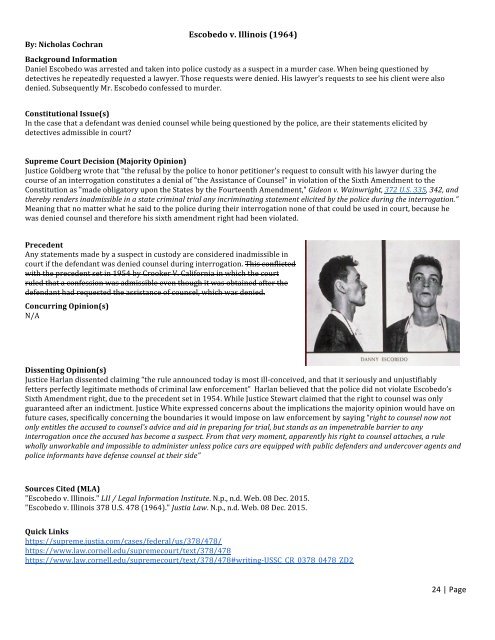Supreme Court Cases Period 1 Fall 2015
t3jDlD
t3jDlD
You also want an ePaper? Increase the reach of your titles
YUMPU automatically turns print PDFs into web optimized ePapers that Google loves.
By: Nicholas Cochran<br />
Escobedo v. Illinois (1964)<br />
Background Information<br />
Daniel Escobedo was arrested and taken into police custody as a suspect in a murder case. When being questioned by<br />
detectives he repeatedly requested a lawyer. Those requests were denied. His lawyer’s requests to see his client were also<br />
denied. Subsequently Mr. Escobedo confessed to murder.<br />
Constitutional Issue(s)<br />
In the case that a defendant was denied counsel while being questioned by the police, are their statements elicited by<br />
detectives admissible in court?<br />
<strong>Supreme</strong> <strong>Court</strong> Decision (Majority Opinion)<br />
Justice Goldberg wrote that “the refusal by the police to honor petitioner's request to consult with his lawyer during the<br />
course of an interrogation constitutes a denial of "the Assistance of Counsel" in violation of the Sixth Amendment to the<br />
Constitution as "made obligatory upon the States by the Fourteenth Amendment," Gideon v. Wainwright, 372 U.S. 335, 342, and<br />
thereby renders inadmissible in a state criminal trial any incriminating statement elicited by the police during the interrogation.”<br />
Meaning that no matter what he said to the police during their interrogation none of that could be used in court, because he<br />
was denied counsel and therefore his sixth amendment right had been violated.<br />
Precedent<br />
Any statements made by a suspect in custody are considered inadmissible in<br />
court if the defendant was denied counsel during interrogation. This conflicted<br />
with the precedent set in 1954 by Crooker V. California in which the court<br />
ruled that a confession was admissible even though it was obtained after the<br />
defendant had requested the assistance of counsel, which was denied.<br />
Concurring Opinion(s)<br />
N/A<br />
Dissenting Opinion(s)<br />
Justice Harlan dissented claiming “the rule announced today is most ill-conceived, and that it seriously and unjustifiably<br />
fetters perfectly legitimate methods of criminal law enforcement” Harlan believed that the police did not violate Escobedo’s<br />
Sixth Amendment right, due to the precedent set in 1954. While Justice Stewart claimed that the right to counsel was only<br />
guaranteed after an indictment. Justice White expressed concerns about the implications the majority opinion would have on<br />
future cases, specifically concerning the boundaries it would impose on law enforcement by saying “right to counsel now not<br />
only entitles the accused to counsel's advice and aid in preparing for trial, but stands as an impenetrable barrier to any<br />
interrogation once the accused has become a suspect. From that very moment, apparently his right to counsel attaches, a rule<br />
wholly unworkable and impossible to administer unless police cars are equipped with public defenders and undercover agents and<br />
police informants have defense counsel at their side”<br />
Sources Cited (MLA)<br />
"Escobedo v. Illinois." LII / Legal Information Institute. N.p., n.d. Web. 08 Dec. <strong>2015</strong>.<br />
"Escobedo v. Illinois 378 U.S. 478 (1964)." Justia Law. N.p., n.d. Web. 08 Dec. <strong>2015</strong>.<br />
Quick Links<br />
https://supreme.justia.com/cases/federal/us/378/478/<br />
https://www.law.cornell.edu/supremecourt/text/378/478<br />
https://www.law.cornell.edu/supremecourt/text/378/478#writing-USSC_CR_0378_0478_ZD2<br />
24 | Page


